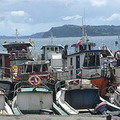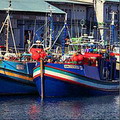 聯合國糧農組織今天(10日)表示,全球魚獲量減少可能是因為氣候變遷的關係。
聯合國糧農組織今天(10日)表示,全球魚獲量減少可能是因為氣候變遷的關係。
更令人擔憂的是,漁業社區通常都位於高緯度地區,因而非常仰賴生態系統,如湧升流或珊瑚礁等,但這些自然現象都非常容易受到氣候變遷的影響。
尤其位於三角洲、珊瑚礁島、冰海沿岸的漁業社區對於海平面上升以及具風險性的洪水氾濫、鹽水入侵、海岸侵蝕等都特別脆弱。
聯合國官員進一步表示,「但是很多國家對於氣候變遷的適應能力卻相當有限,即使是位於低風險地區的國家之適應力都同樣脆弱。」
因此,聯合國糧農組織7月8日到11日在其總部羅馬舉行為期四天的科學研討會中提出警告,呼籲大家必須注意氣候變遷和海洋漁業的相關議題。
這個議題吸引了世界上超過200位專家學者以及政策決策者的注意,其也試圖解決氣候變遷對所帶來的挑戰,包括對海洋漁業的影響,以及千千萬萬必須仰賴漁收作為食物或收入來源的人們等。
根據聯合國糧農組織(FAO)的統計,大約有4200萬人民直接以漁業為生,其大部分都是在開發中國家;加上相關的漁業加工、行銷、銷售和供應工業等,這些相關領域支持著好幾億人民的生計。
 聯合國糧農組織在一份聲明中指出,世界海洋暖化的情況很可能會持續下去,但是因為地理差異以及年代不同,所受的影響也略有不同。另外,地表水暖化的情況越來越激烈,而且不只是地表水,甚至在大西洋深層水也顯示出海水暖化的明顯徵兆。
聯合國糧農組織在一份聲明中指出,世界海洋暖化的情況很可能會持續下去,但是因為地理差異以及年代不同,所受的影響也略有不同。另外,地表水暖化的情況越來越激烈,而且不只是地表水,甚至在大西洋深層水也顯示出海水暖化的明顯徵兆。
然而聯合國糧農組織也表示,氣候變遷對於漁業和農業的衝擊已經獲得相當程度的關注。
科學家已經證明氣候變遷對漁群的分佈具有相當的影響,溫水物種慢慢移到地球的兩極,而冷水物種也有相同的現象。
研究也顯示,海水鹽度也慢慢產生變化,近地表水有更多區域的水分蒸發,因而世界上大部分的海洋鹽度增加。
A decrease in global fisheries production is likely as a result of climate change, the UN food and agriculture agency said today.
Most at risk are fishing communities located in the high latitudes and those that rely on ecosystems such as upwelling or coral reefs, that are susceptible to climate change.
Fisheries communities located in deltas, coral atolls and ice dominated coasts will be particularly vulnerable to sea level rise and associated risks of flooding, saline intrusion and coastal erosion.
But countries with limited ability to adapt to the changes, even if located in low risk areas, are also vulnerable, UN officials said.
The UN food agency's warning comes at a four day scientific symposium on climate change and marine fisheries being held at its Rome headquarters July 8-11.
The event drew more than 200 experts and policymakers from around the world in an attempt to tackle the challenges that climate change poses to marine fisheries and the millions of people who depend on them for food and income.
Some 42 million people work directly in the fisheries sector, the great majority in developing countries. Adding those who work in associated processing, marketing, distribution and supply industries, the sector supports several hundred million livelihoods, according to the UN Food and Agriculture Organization, FAO.
The ongoing warming of the world's oceans is likely to continue, but with geographical differences and some decadal variability, said the FAO in a statement. "Warming is more intense in surface waters but is not exclusive to these, with the Atlantic showing particularly clear signs of deep warming."
Impacts of climate change on fisheries and aquaculture are already being observed, the FAO says.
Scientists have documented changes in fish distributions in response to climate variations. Warm water species are moving toward the Earth's two poles, and so are the colder water species.
Shifts in ocean salinity are occurring, studies show, with near-surface waters in the more evaporative regions of most of the world's oceans increasing in salinity.
全文及圖片詳見:ENS




